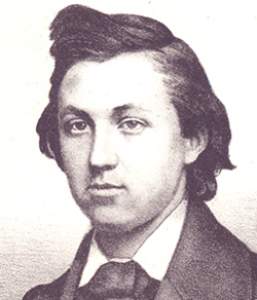Horatio Collins King (Dickinson Chronicles)
War erupted and King sought a commission in the United States Army. In 1862 he received his appointment as assistant quartermaster of volunteers with the rank of captain in the Army of the Potomac from his former mentor Stanton. He was soon promoted to chief quartermaster of the First Cavalry Division of the Army of the Shenandoah. He took part in five battles following this appointment, and he was recommended for promotion because of gallantry at the Battle of Five Forks. King was honorably discharged in October 1866 with the brevets of major, lieutenant colonel, and colonel. He returned to the practice of law in New York City until 1871, when he assumed the position of associate editor at the New York Star. King then became publisher of the Christian Union with his close friend, Reverend Henry Ward Beecher, as editor. He also helped to edit The Christian at Work. In 1874, King returned to his law practice and remained active in the profession for the remainder of his life.
King joined the National Guard of New York in 1876 and was elected major of the Thirteenth Regiment. He was appointed judge advocate for the Eleventh Brigade in 1880 and, in 1883, was appointed by Governor Grover Cleveland to be judge advocate general, with the rank of brigadier general, in the National Guard, State of New York. He served as secretary of the Society of the Army of the Potomac from 1877 to 1904 and as president of the organization in 1904. He was a member of the Order of Elks, a Mason, and a charter member of the New York Commandery of the Military Order of the Loyal Legion. King was also an active member of the Grand Army of the Republic, serving two years as post commander and one year as department judge advocate general. King served for ten years as a member of the Brooklyn Board of Education and a member of the New York Monuments' Commission. King ran for Secretary of State of New York in 1895 on the Democratic ticket, but was defeated. He then ran for Congress in 1896 for the Sound Money Party, but was again defeated. When later nominated for office, King declined.
King served as a trustee of Dickinson College from 1896 to 1918, and is perhaps best known by the college as the author of numerous school songs including Dickinson's Alma Mater, "Noble Dickinsonia." He received an honorary doctor of laws degree from Allegheny College in 1897, and in the same year, Horatio Collins King was awarded the Congressional Medal of Honor for "conspicuous gallantry" while serving with the cavalry in March 1865 near Dinwiddie Court House.
King married Emma Carter Stebbins, daughter of New York merchant Russell Stebbins, in October 1862. Following Emma's death around the conclusion of the Civil War, he married Esther Augusta Howard (1845-1925), the daughter of Captain John T. Howard with whom King had served during the War, in June 1866. He and Esther had nine children and resided in Brooklyn, New York, for much of their lives. Horatio Collins King died on November 15, 1918 in Brooklyn, New York.
Horatio Collins King (National Cyclopaedia)
Horatio Collins King (Kates, 2000)
Horatio Collins King (New York Monuments Commission, 1916)
Horatio Collins King (New York Times)
Lawyer, Editor, and Lecturer, Who Was Prominent in Brooklyn Life.
HIS RECORD IN CIVIL WAR
Won the Congressional Medal of Honor for Conspicuous Bravery in the Field
General Horatio Collins King, lawyer, journalist, and one of the most distinguished veterans of the civil war, died yesterday at his residence, 46 Willow Street, Brooklyn, from heart disease. General King, who was in his eighty-first year, was stricken with paralysis early in 1914, and in August, 1917, he suffered a severe heart attack.
General King was born at Portland, Me., the son of Horatio King, editor of The Portland Jeffersonian, who later became Postmaster General under President Buchanan. He was graduated from Dickinson College in 1858, and after studying law for two years with Edwin M. Stanton, afterward Secretary of War, he entered the law office of Edgar S. Van Winkle in this city. He was admitted to the bar in 1861.
When the civil war began he received an appointment as Assistant Quartermaster with the rank of Captain, and afterward served in the same capacity on the staff of General Heintzelman and General Auger, later becoming Chief Quartermaster of General De Bussy’s division. Still later, with the rank of Major, he was assigned to the staff of General Wesley Merritt. For distinguished service at the battle of Five Forks and in the James River raid, in which he brought up reserves in time to repel a charge of Confederates, he was brevetted Colonel. Later he received the Congressional Medal of Honor for conspicuous bravery. At the close of the war he returned to New York to resume his law practice.
From 1871 to 1873 General King was editor of The New York Star, and then became publisher of The Christian Union, of which his friend, Henry Ward Beecher, was the editor. Later he became publisher of The Christian at Work under the editorship of the Rev. T. De Witt Talmage.
General King was twice married, his first wife having been Miss Emma C. Stebbins, who died in 1864. In 1866 he married Miss Esther Howard, daughter of the late John Tasker Howard.






